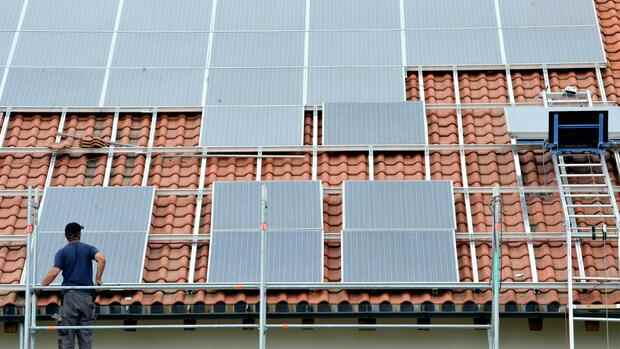The federal government wants to massively accelerate the expansion of renewable energies. According to government circles, Economics and Climate Protection Minister Robert Habeck (Greens) will introduce a comprehensive package of measures to the cabinet on Wednesday.
The so-called Easter package provides for changes to numerous laws and regulations. This is intended to implement energy policy goals from the traffic light coalition agreement, which are independent of the war in Ukraine but have become even more important due to the high dependence on energy supplies from Russia.
In government circles it was said that there was a double urgency. “On the one hand, the climate crisis is coming to a head. On the other hand, Russia’s invasion of Ukraine, in violation of international law, shows how important it is to phase out fossil fuels and push ahead with the expansion of renewables.”
With the Easter package comes the biggest change in energy policy in decades. “It will comprehensively accelerate the expansion of renewable energies, on water, on land and on the roof.”
Top jobs of the day
Find the best jobs now and
be notified by email.
Habeck wants to present the plans on Wednesday afternoon in Berlin. No information was initially given about the costs. In the future, the money will come from the climate fund, which has just been increased by 60 billion euros.
>> Also read: Change electricity supplier – How to find a good electricity contract
The Easter package is intended to change, among other things, the Renewable Energy Sources Act (EEG) and the Offshore Wind Energy Act. The principle is anchored that the use of renewable energies is in the overriding public interest and serves public safety.
By 2030, at least 80 percent of German electricity consumption should come from renewable sources. By 2035 it should be almost 100 percent. For comparison: in 2021 the rate was only 42 percent.
Better remuneration for electricity from solar systems on roofs
However, experts anticipate an increase in power consumption. “It follows that in 2030 a total of around 600 terawatt hours of electricity should be provided in Germany from renewable energies,” government circles said.
It is also planned to provide new areas for the expansion of photovoltaics. The remuneration for solar power will be increased significantly. That should take effect as early as 2022. Low-wind locations are also to be developed more intensively. The expansion targets for offshore wind energy are being increased to at least 30 gigawatts by 2030, at least 40 gigawatts by 2035 and at least 70 gigawatts by 2045.
The requirements plan for the expansion of the transmission grids will also be updated. “19 new grid expansion projects will be included and 17 grid expansion projects will be changed.”
Wind turbines are repeatedly criticized by local residents. The federal government now wants to speed up planning and approvals for areas that have already been pre-examined. “Environmental assessments and participation rights are bundled more strongly.”
Changes could come into effect as early as July 1st
The government’s plans still have to go through the Bundestag. The changes are expected to come into effect as early as July 1st.
Further climate protection measures are expected over the course of the year. Above all, they should ensure more energy efficiency in buildings and progress in the CO2 targets for the transport sector. The plan that states should allocate two percent of their area to wind energy is also controversial.
Germany, which is still heavily dependent on gas and oil supplies from Russia, is expected to be climate neutral overall by 2045. That is why Habeck has promised to triple the pace of climate protection.
However, Germany’s greenhouse gas emissions increased significantly again last year. The building and transport sectors did not meet their targets, unlike industry and agriculture.
More: Shares from the wind energy industry are in demand
